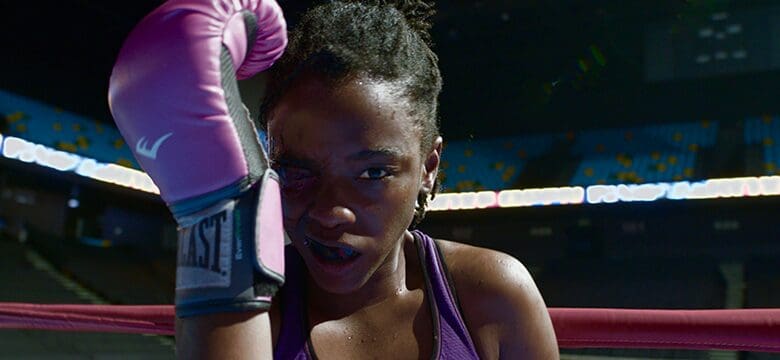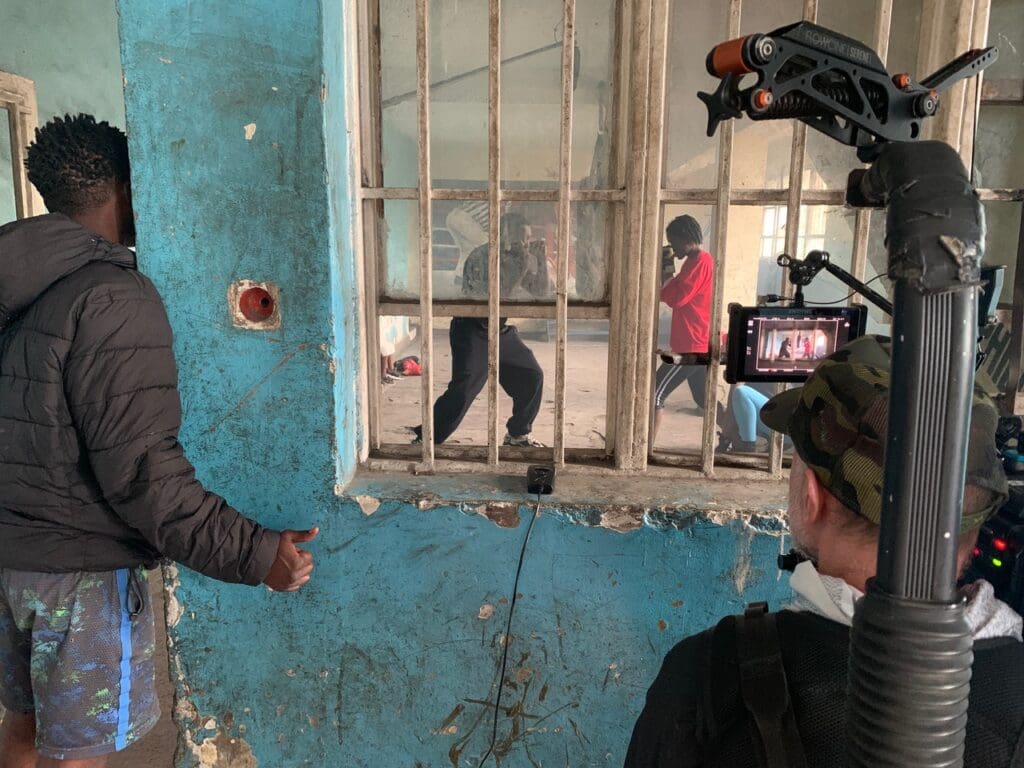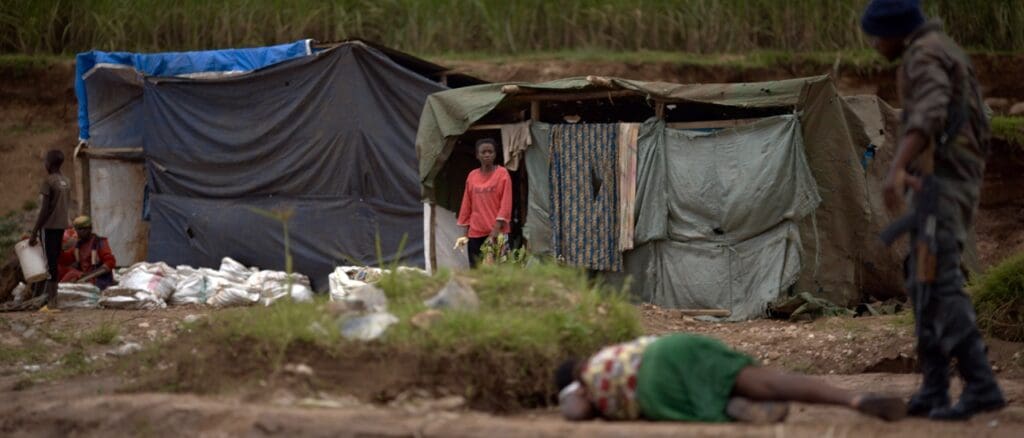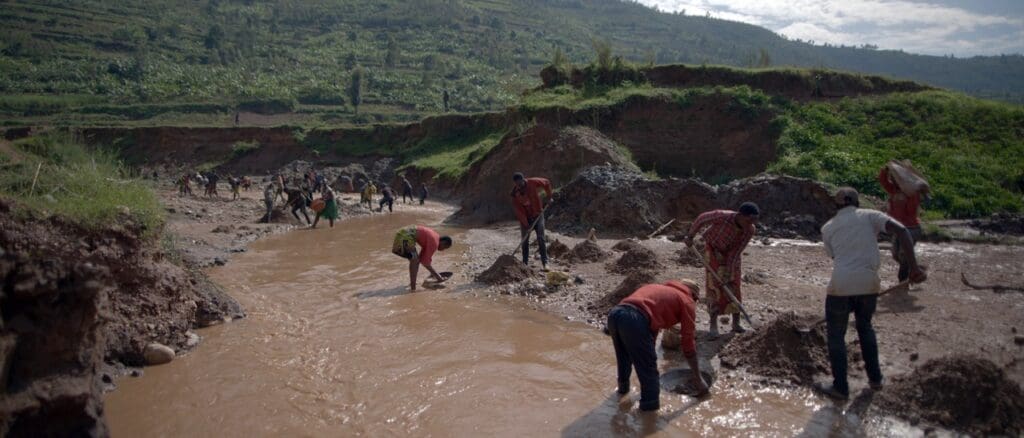As Fight Like A Girl opens the 2025 Toronto Black Film Festival, the film’s powerful message has taken on an even deeper significance. In a tragic turn of events, Kibomango, the real-life boxing coach portrayed in the film, was recently killed in rebel attacks in Goma, Congo—just as director Matt Leutwyler narrowly escaped gunfire while in the region.
Now, as the festival shines a spotlight on stories that demand global attention, Fight Like A Girl stands as a testament to resilience, survival, and the fight for justice. In this exclusive Q&A, we speak with Matt Leutwyler about the making of the film, the ongoing crisis in Congo, and how storytelling can be a catalyst for awareness and change. —Noa Nichol
What originally drew you to the story of Fight Like A Girl?
I first came across a series of striking photographs on Instagram—powerful images of young Congolese women, resilient and strong, posing with their boxing gloves and sparring in the ring. Something about them resonated with me. As I started looking into who they were, I uncovered the incredible story of Balezi Bagunda, known as ‘Kibomango’—a former child soldier who became a champion boxer, then a mentor to street kids, and ultimately the trainer of the first all-women’s boxing club in the region. He used boxing not just as a sport, but as a tool to help survivors of sexual violence regain their confidence, independence, and sense of agency.
I shared the story with my producing partner, Anton Laines, and we both felt it was something we needed to explore. I traveled to Goma to meet Kibomango, and over the next six months, we worked to gain his trust. Eventually, he and the women allowed us to begin following them for a documentary on their lives.
As we immersed ourselves in their world, I started developing a scripted version of the story, focusing on one of the young women and her relationship with Kibomango. We took the script to Colin and Yvette Gayle at Africa Creative Agency, and they immediately agreed this was a story that needed to be told. When we met Ama Qamata in person, we knew we had found the perfect actor to play Safi.
We decided to take a break from the documentary to shoot the feature film, and once production on that wrapped, we resumed filming the doc, which is now entering its fifth and final year of production
Kibomango, the real-life boxing coach portrayed in the film, was tragically killed in the recent rebel attacks in Goma. How has this heartbreaking loss impacted the way you see and share the film?
Kibomango was so much more than the subject of a film—he became our partner, our protector in Congo, and, ultimately, a dear friend. His loss is devastating.
Beyond his work as a boxing coach, he was deeply involved in our efforts to support vulnerable children. When a rebel attack forced us to evacuate 40 children supported by We Are Limitless, the charity I founded in 2012, Kibomango was instrumental in helping us get them to safety. Tragically, the following day, on January 25, as we were trying to transport an injured student from the hospital and cross the border into Rwanda, Kibomango was killed. It’s only been two weeks, and we are still in shock.
For years, he helped me deliver food and supplies to the children we support in Congo. He was selfless, courageous, and determined to make a difference in the lives of others. I hope Fight Like A Girl inspires people to learn more about him and the decades-long crisis in eastern Congo. One thing that brings me comfort is knowing how proud he was that Hakeem Kae-Kazim portrayed him in the film. I think Hakeem’s performance is a fitting tribute to this wonderfully complex man, and I’m grateful that his story will continue to be shared.
You personally experienced the ongoing crisis in Congo while trapped in a hotel during heavy gunfire. Can you describe what that experience was like, and how it deepened your perspective on the story you were telling?
I’ve spent a lot of time in East Congo, so I’m familiar with the challenges people face there, and I’ve certainly had my share of moments that most would consider dangerous. But this was on a whole different level. I had never been caught in that kind of sustained firefight, where so many people were being killed.
We contacted the U.S. Embassy, but they told me I was on my own—there was nothing they could do to help me evacuate. That was an incredibly isolating feeling. We had people in the U.S. and Rwanda working to find ways to get me out, but every plan kept falling apart as the situation on the ground kept shifting.
Finally, on the fourth day of fighting, M23 launched a massive push and took control of Goma. In the midst of the chaos, I was able to get Musa, my student from the clinic, and my proaction manager Clarisse had arranged for a car to take us as close to the border as possible. But with the streets in turmoil, we had to get out and walk. Musa was in no condition to move on his own, so I carried him through most of the way until we finally crossed into Rwanda, where he was able to receive medical attention. Thankfully, he is going to make a full recovery.
Experiencing something like that firsthand gave me an even deeper understanding of the constant instability and danger that people in this region live with every day. It reinforced just how important it is to share stories like Fight Like A Girl—not just to highlight resilience and strength, but also to bring attention to a crisis that has been ongoing for decades.
Why do you think Fight Like A Girl is such an important story to share at this moment, especially as the crisis in Congo continues to unfold?
Well, I think our film is more than just a story about boxing—it’s about resilience, survival, and reclaiming power in the face of unimaginable hardship. As the crisis in Congo continues to unfold, stories like this are more important than ever. They shine a light on the strength of those who refuse to be defined by violence and give a human face to a decades-long conflict that the world too often ignores. Kibomango and the women of his boxing club fought every day—not just in the ring, but for their dignity, their future, and their right to be seen. I hope this film helps amplify their voices and sparks a greater awareness of what’s happening in eastern Congo right now.
How did you approach working with local Congolese talent and communities to ensure authenticity in the film?
Fight Like A Girl is the first Western narrative feature to be shot in East Congo, and from the beginning, authenticity was our top priority. We blended documentary-style techniques with a scripted narrative, filming in uncontrolled environments and casting local street kids, militia members, and real boxers from Kibomango’s club in supporting roles. Instead of locking down streets and using professional extras, we shot in ‘live’ locations to capture the raw energy of the city—sometimes even using hidden cameras.
One of the most memorable moments was when a real Good Samaritan tried to tackle a street kid during a scene where Safi’s fish is stolen, thinking it was an actual theft. Our producer, Innocent Munyeshuri, had to jump in and explain that it was part of the film.
The film highlights resilience, strength, and the fight for survival. What do you hope audiences take away from the powerful themes in Fight Like A Girl?
I hope audiences walk away inspired by the resilience and strength of these women—not just in the ring, but in their daily fight for dignity, survival, and self-determination. Fight Like A Girl is about more than boxing; it’s about reclaiming power in a world that has tried to take it away. It also highlights the importance of allies like Kibomango, who turned his own life around and made it his mission to help others. My hope is that the film sparks awareness, empathy, and a deeper understanding of the ongoing crisis in Congo, while celebrating the courage of those who refuse to be defined by it.
What challenges did you face while filming in such a politically unstable region, and how did you navigate them?
Filming in an active conflict zone came with immense challenges. The war between Congolese forces and M23 rebels was escalating, and just weeks before shooting, the UN offices next to our hotel were attacked and burned. Every day, we had to adapt—sometimes changing locations at a moment’s notice, with armed soldiers ensuring the safety of our cast and crew.
Despite the tensions in the region, our mixed Congolese and Rwandese team came together under extreme conditions to tell this story. That collaboration is something I’m incredibly proud of. In the end, we wanted the film to not just depict life in Congo but to feel like it was truly part of it
The Toronto Black Film Festival is a major platform for Black voices in cinema. What does it mean to you to have Fight Like A Girl as the opening night film?
It’s an incredible honor to have Fight Like A Girl open the Toronto Black Film Festival. This festival is a vital platform for celebrating Black voices and stories, and we’re proud to share a film that amplifies the resilience and strength of Congolese women. Given the ongoing crisis in Congo, it’s more important than ever to shine a light on their fight for dignity and justice. We hope this film sparks conversation, awareness, and a deeper connection to their story.
Beyond screenings, how do you hope this film can create real-world impact and awareness for the situation in Congo?
Beyond screenings, I hope our film sparks real awareness and action around the ongoing crisis in Congo. Through We Are Limitless, the charity I founded, we support Rwandan and Congolese children and women by providing education and healthcare. Kibomango was a vital part of that mission, helping protect and uplift vulnerable youth, and his legacy lives on in the lives he touched. If people are moved by the film and want to help, they can support our efforts to continue providing these essential resources by visiting www.wearelimitless.org
We’re also wrapping up our festival run and have been incredibly grateful for the response and accolades the film has received. We’ll be announcing our distribution plans for North America in the coming weeks, and we’re excited to share this story with an even wider audience.
What’s next for you as a filmmaker? Do you see yourself continuing to tell stories that shine a light on global humanitarian issues?
Definitely. Everything Anton, Clarisse, and I are building at KG28 Media is focused on global stories that both entertain and inform. We have several projects in development, including Dead Waters, a thriller set in the world of Nigerian oil piracy, and a comedy series in collaboration with our friends at Africa Creative Agency about a young African woman running a small orphanage while navigating the chaos of “voluntourists” to keep her NGO afloat.






Be the first to comment